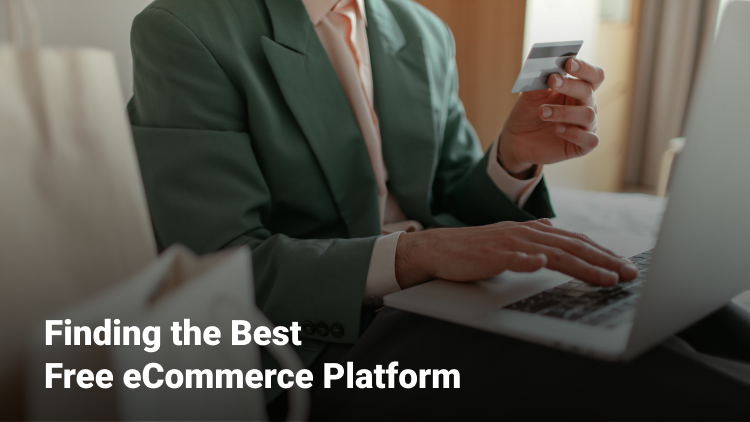- What Is eCommerce?
- How to Choose the Best Free eCommerce Platform
- Comparison of the Best Platforms
- You Can Use These Platforms for Your Online Store
- Pros & Cons of Free eCommerce Platforms
- Conclusion
Are you searching for a top-notch free eCommerce platform to construct your own online store?
In the past, the cost of eCommerce platforms often deterred small businesses from establishing their presence online.
However, the good news is that nowadays there are numerous well-known eCommerce platforms that offer free or affordable options.
In this article, we will evaluate the finest and most widely-used free eCommerce platforms, providing you with a comprehensive analysis of their advantages and disadvantages. This way, you can select the ideal eCommerce website builder that suits your specific requirements.
What Is eCommerce?
Ecommerce, short for electronic commerce, refers to the buying and selling of goods and services over the internet. It has revolutionized the way businesses operate and consumers shop, providing convenience, accessibility, and a global marketplace.
How to Choose the Best Free eCommerce Platform
Let’s face the reality: there is no such thing as a completely free eCommerce website or platform.
Even if the eCommerce platform itself is free, you will still need to incur costs for a domain, web hosting, payment processing fees. Potentially other expenses such as extensions or additional features can come up.
That being said, your objective should be to find an eCommerce platform that allows you to get started with minimal to no cost while avoiding significant limitations on how you operate and expand your business.
Ideally, you would want the platform to be user-friendly, feature-rich, and capable of accepting payments through your preferred methods.
Taking these factors into consideration, let’s explore the best free eCommerce platforms available.
Comparison Table of The Best Platforms
| Name | Price | Reviews |
|---|---|---|
| 1. WooCommerce | The plugin itself is free, the Essential plan starts at $25 per month if billed annually. | 4.4  based on 1,078 reviews |
| 2. Shopify | The Basic plan starts at $24 per month if billed annually. | 4.4  based on 4,362 reviews |
| 3. Weebly | A Free plan is available, the Personal plan starts at $10 per month if billed annually. | 4.1  based on 451 reviews |
| 4. BigCommerce | The Standard plan starts at $29 per month if billed annually. | 4.2  based on 461 reviews |
| 5. BigCartel | Free for 5 products, $9.99 per month for 50 products, and $19.99 for 500 products. | 4.2  based on 26 reviews |
| 6. BuyNow Plus | 3% transaction fee, although a minimum of $0.30 | N/A |
6 of the Best ‘Free’ eCommerce Platforms for Your Online Store
1. WooCommerce
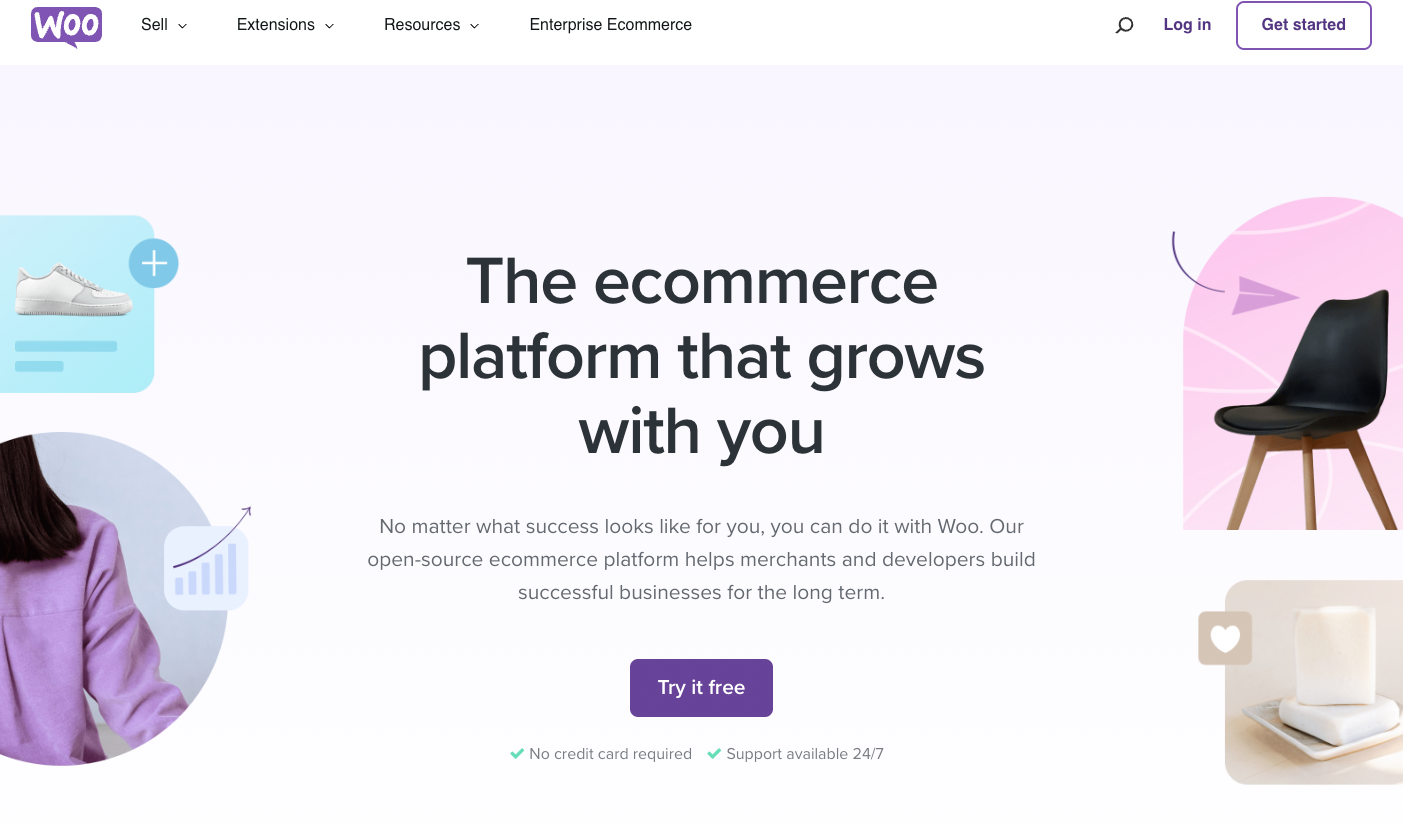
WooCommerce stands as the most widely used eCommerce plugin for WordPress, offering a highly popular solution. It serves as a fully free and open-source eCommerce platform that can be easily downloaded and deployed on any web hosting provider.
However, it’s important to note that WooCommerce does not provide hosting services itself. You will need to separately purchase web hosting and a domain name. This will ensure that your website is accessible to everyone.
For hosting, we suggest considering either Bluehost or SiteGround. These hosting providers are recognized as industry leaders and are officially recommended by WooCommerce itself. They offer reliable services and support to cater to your eCommerce website’s requirements.
Advantages
Starting with WooCommerce is a breeze, even if you’re completely new to the world of online stores. You can swiftly create your own eCommerce website without much hassle.
By opting for self-hosting, you gain complete control over your website. Although you’ll need to invest in WooCommerce hosting, it doesn’t necessarily have to be expensive.
One of the advantages of WooCommerce is the abundance of themes available. This allows you to choose a design that perfectly aligns with your brand, enabling you to create a store that truly represents your business.
The extensive collection of WooCommerce plugins provides you with numerous opportunities to enhance your store’s functionality and facilitate business growth.
WooCommerce caters to a wide range of product types. Whether you’re selling physical goods, digital downloads, offering membership plans, managing a dropshipping store, or promoting affiliate products, WooCommerce has a solution for you.
The flexibility of WooCommerce allows you to add an unlimited number of products to your store, empowering you to expand your eCommerce business to any extent you desire.
It’s worth noting that WooCommerce itself doesn’t charge any transaction fees. Instead, you’ll only need to pay your chosen payment service provider, such as PayPal, Stripe, or your bank, for the transaction processing.
Disadvantages
For those who are new to the world of eCommerce, starting with WooCommerce can be a bit challenging compared to certain alternative options. It has a slight learning curve that might require some extra effort.
To set up your WooCommerce store, you’ll need to purchase hosting and a domain name separately. These are essential components for running your online store effectively.
As your online store grows, it becomes your responsibility to ensure its maintenance. This may involve tasks such as upgrading your hosting plan to accommodate increased traffic and demands, optimizing your WordPress site for better search engine visibility (SEO), or investing in a security plugin to safeguard your store and customer data.
It’s important to be ready for these ongoing responsibilities as your business expands.
2. Shopify

Shopify is a fully hosted eCommerce platform that provides a convenient solution for building and managing online stores.
Additionally, Shopify offers a 14-day free trial, which is advantageous as it does not require a credit card to start the trial. This allows you to explore and familiarize yourself with the platform’s features and capabilities before making a financial commitment.
Advantages
Getting started with Shopify is incredibly simple. Their website builder features a user-friendly drag-and-drop interface, making it accessible even for those with little to no experience, allowing you to create an attractive online store effortlessly.
To expand the functionality of your store, Shopify offers an extensive app marketplace where you can find a wide range of add-ons available for purchase. These add-ons enable you to enhance your store’s features and tailor it to your specific requirements.
Shopify ensures round-the-clock customer support, available through various channels such as live chat, phone, email, and Twitter. This ensures that you can seek assistance and resolve any queries or concerns at any time, providing peace of mind.
Shopify Payments, the built-in payment gateway provided by Shopify, charges a standard fee of 2.9% plus 30 cents per transaction. This pricing is on par with other payment processors like Stripe. The advantage is that it is seamlessly integrated into the platform, simplifying the setup process and allowing users to start accepting payments swiftly.
Disadvantages
If you opt to use third-party payment gateways such as PayPal or Stripe instead of Shopify Payments, Shopify imposes an additional 2% transaction fee on top of the fee charged by the chosen payment gateway.
It’s important to note that the free trial period for Shopify is relatively short, lasting only 3 days. Following the trial, you will need to transition to a paid plan.
While the regular starting price for the paid plans is typically $29 per month, there is currently a discounted offer available. You can take advantage of this promotion, which reduces the cost to just $1 for the first 3 months of subscription.
3. Weebly
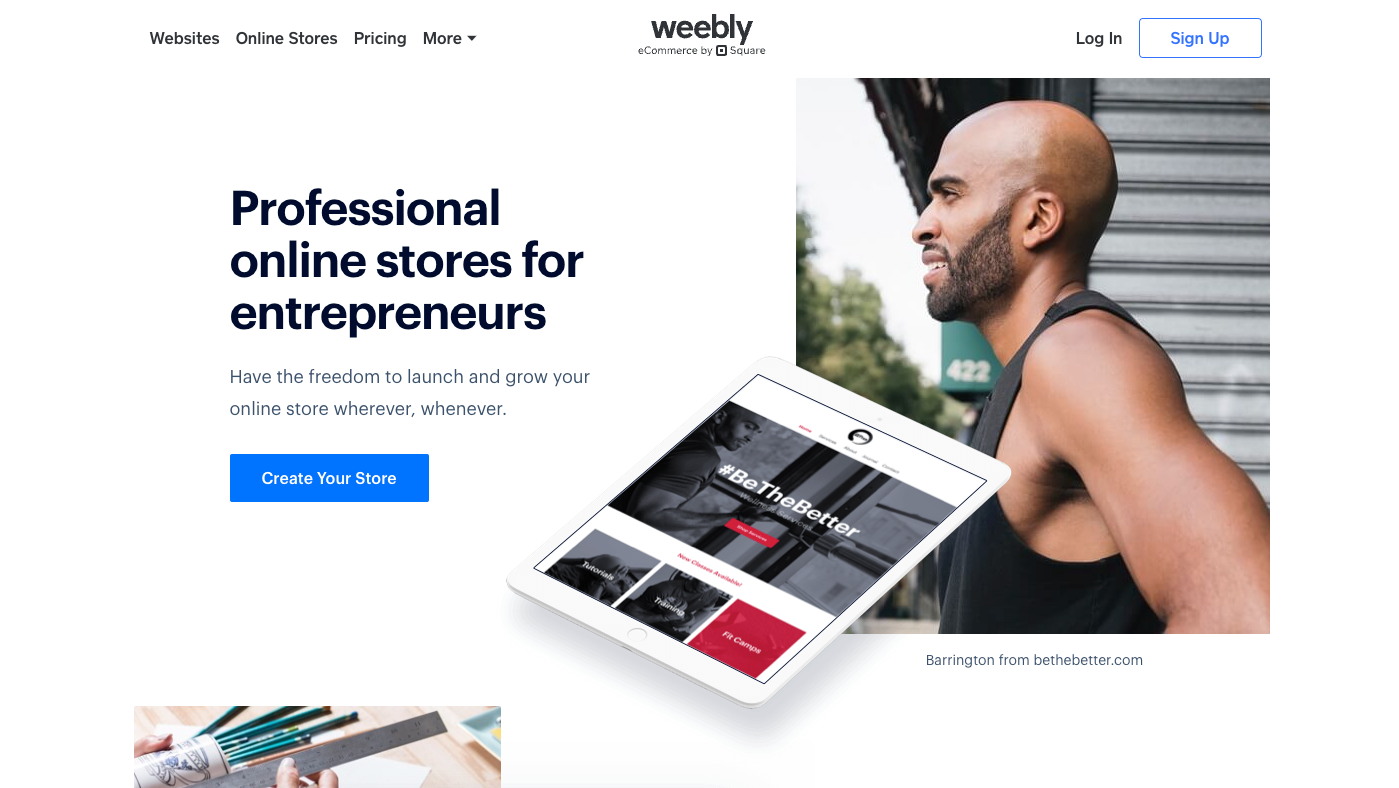
Although Weebly (eCommerce by Square Online) may not enjoy the same level of prominence as other eCommerce platforms such as Shopify and WooCommerce, they do provide a valuable offering in the form of a free trial.
This trial period allows users to experiment with the Weebly platform and its features, enabling them to gain firsthand experience and assess its suitability for their ecommerce needs.
Advantages
You have the flexibility to include various types of physical or digital products within your store. The user-friendly drag-and-drop interface simplifies the process of building your website and managing your store’s items.
With approximately 100 different themes available, you have a wide range of design options to choose from, ensuring that you can find a theme that perfectly suits your site.
Weebly offers built-in features for checkout, inventory management, shipping, and tax management, streamlining essential aspects of running an online store.
In addition to a community forum, the free plan provides access to support through live chat, email, and even phone, ensuring that you have assistance available when needed.
Should you decide to upgrade to a paid plan, Weebly offers affordable options, catering to the needs of small businesses and startups. The Professional plan, for instance, starts at $12 per month when paid annually.
Disadvantages
Weebly imposes a 3% transaction fee on each sale, which is separate from any transaction fees charged by your chosen payment gateway.
If you are on the free or Personal ($10/month) plans, Weebly will display ads and branding from Square, which is Weebly’s parent company.
Furthermore, even with the paid starter plan, there is a limitation that allows you to sell only up to 25 products simultaneously.
4. BigCommerce
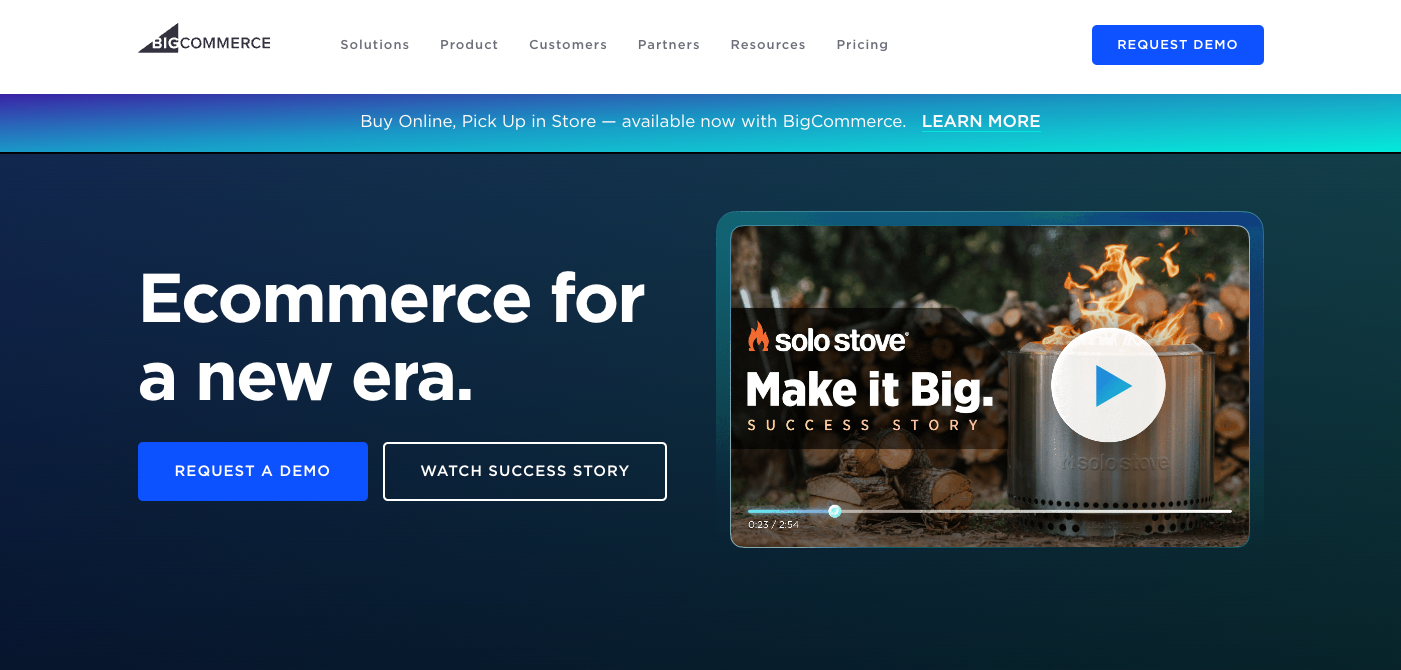
BigCommerce serves as a comprehensive, fully hosted eCommerce platform that empowers you to build your own online store.
Additionally, if you already have an existing site on WordPress, there is a WordPress plugin available that allows you to integrate and utilize BigCommerce.
Although BigCommerce does not offer a free plan, they do provide a free trial option. This trial period allows you to set up your online business and commence your eCommerce journey without any upfront payment, giving you the opportunity to explore and experience the platform before making a financial commitment.
Advantages
No credit card information is required to access the free trial offered by BigCommerce. Therefore getting started with BigCommerce is remarkably straightforward. Simply sign up, provide the necessary details about your store, and begin adding products to your inventory.
If you prefer not to invest in a custom domain name, BigCommerce allows you to obtain a free domain such as mysite.mybigcommerce.com.
BigCommerce offers various options for accepting payments, with built-in integration for numerous payment platforms including PayPal powered by Braintree, Stripe, Authorize.net, and more.
To enhance the functionality of your BigCommerce store, there is a wide array of third-party apps available that you can integrate.
With an extensive selection of pre-built templates and themes, you can give your storefront a professional appearance, choosing a design that aligns with your brand and enhances the overall visual appeal.
Disadvantages
The duration of the free trial provided by BigCommerce is limited to 15 days, which may not provide ample time to generate revenue from your store. Following the trial period, a monthly subscription fee of $29.95 or more is required to maintain your store’s operations.
As an all-in-one platform, BigCommerce has its own set of add-ons and themes available for use. Therefore you are confined to the options provided by BigCommerce and may not have the same breadth of choices as some other eCommerce solutions.
5. Big Cartel
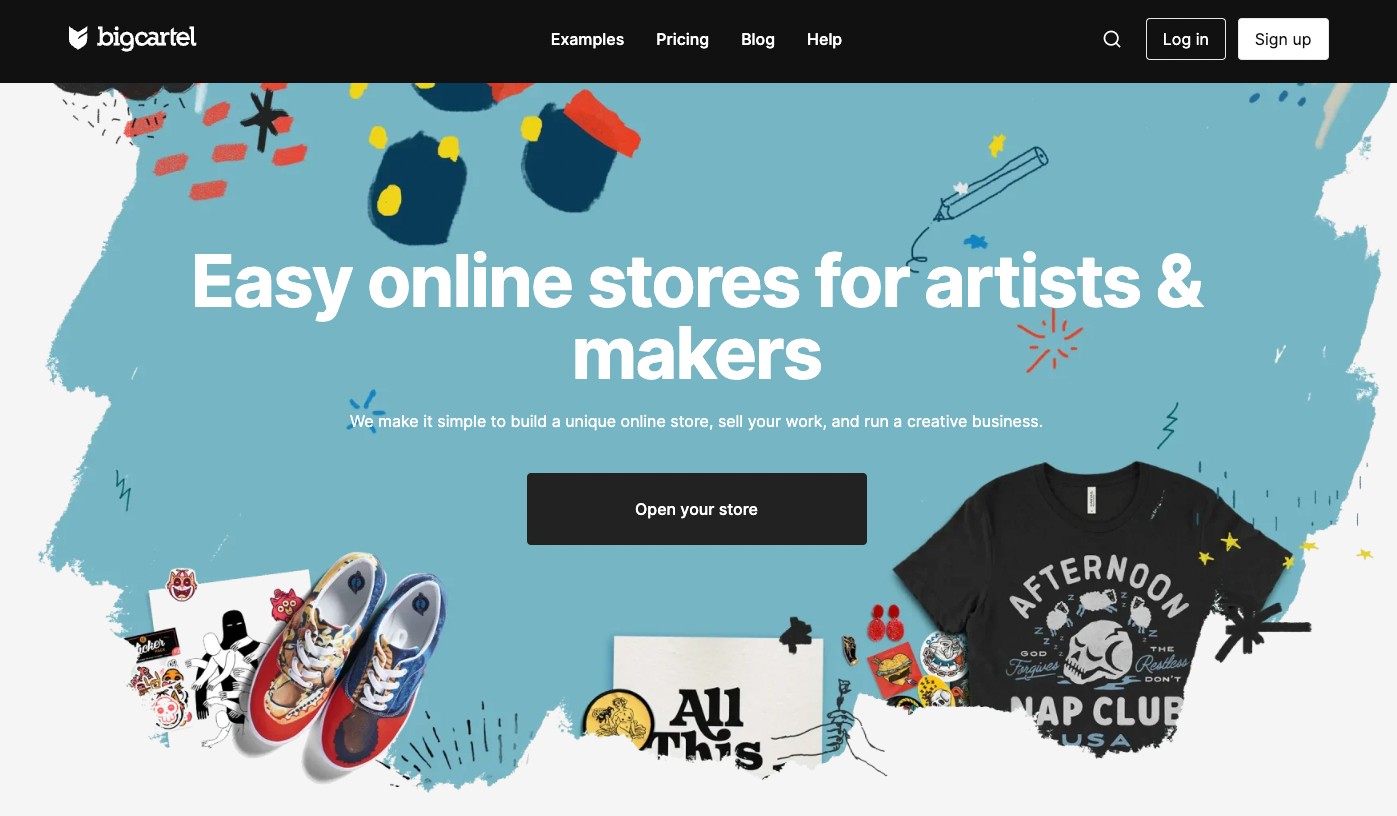
Big Cartel is a fully hosted eCommerce platform that caters specifically to artists and creatives. If you are looking to showcase and sell handmade products or similar artistic creations, Big Cartel could be an excellent choice for your online store.
Advantages
The free plan offered by Big Cartel does not impose any transaction fees on your sales. However, it is important to note that you will still be required to pay fees associated with payment processing through Stripe or PayPal, as these are the only options supported by Big Cartel.
When it comes to your free shop URL, you have the ability to customize it. While it must follow the format of mysite.bigcartel.com, you have the freedom to choose the specific name you desire. This sets Big Cartel apart from other platforms that typically assign a URL based on your username or store name, with no option for customization.
With the free plan, you can showcase up to 5 products, which is a more generous offering compared to other hosted platforms that provide limited features in their free plans.
Setting up your store on Big Cartel is a quick and straightforward process, with the platform guiding you through each step. Adding your products is equally effortless, ensuring a seamless experience for users.
Even with the free plan, Big Cartel provides features such as real-time analytics and marketing tools to facilitate promotions and discounts. This will help you to make informed decisions and effectively market your products.
Disadvantages
In order to customize your website theme on Big Cartel, you will need to edit the theme’s HTML. This process may be less beginner-friendly compared to most other eCommerce platforms, as it requires some familiarity with HTML coding.
The free plan offered by Big Cartel has limited features. If you wish to utilize advanced functionalities such as inventory tracking or discount codes, upgrading to a paid plan is necessary. The paid plans provide access to these additional features, enhancing the capabilities of your online store.
6. BuyNow Plus
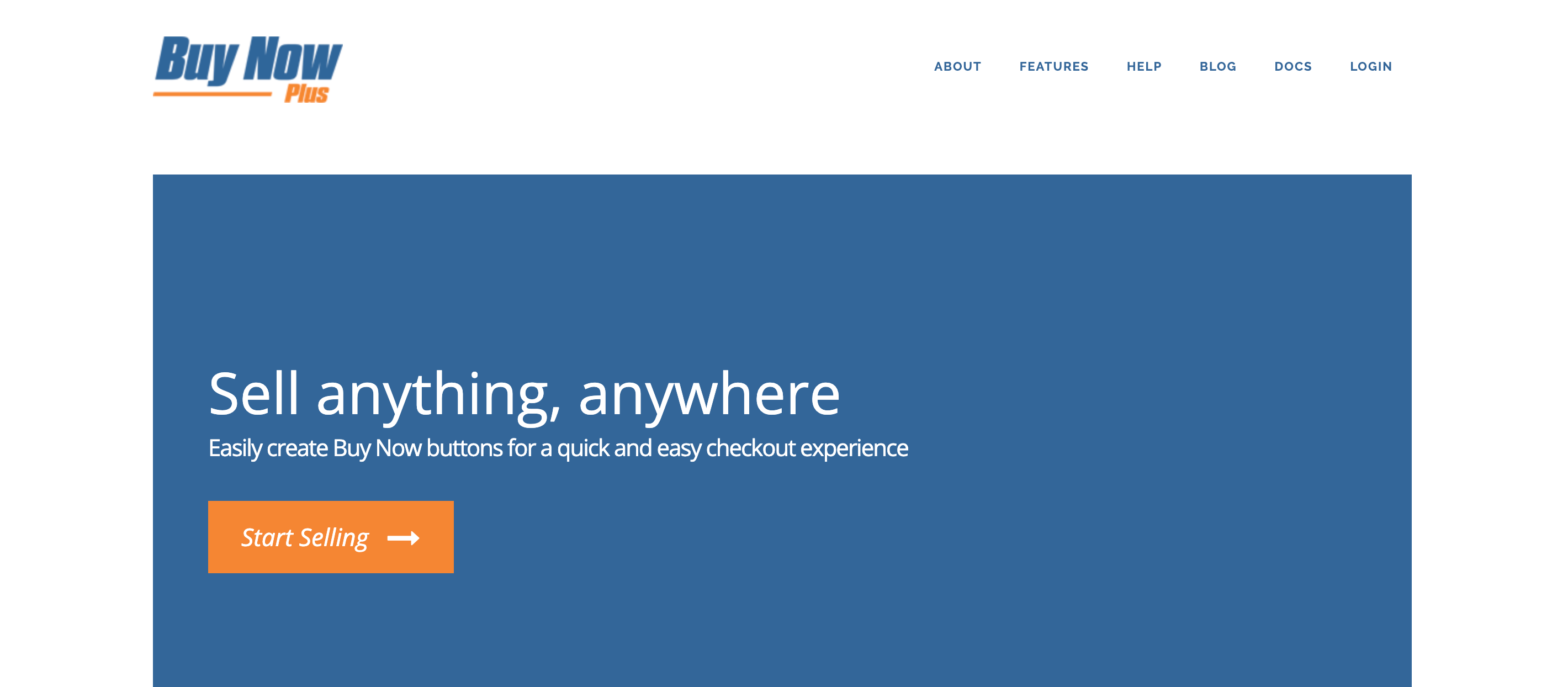
BuyNow Plus does not work with comprehensive eCommerce features. Rather, it offers the capability to generate “buy now” buttons that can be integrated into any website.
To utilize BuyNow Plus, it is necessary to set up a free Stripe account. This integration with Stripe enables the processing of payments and facilitates seamless transactions through the BuyNow Plus service.
Advantage
BuyNow Plus offers the convenience of handling recurring payments on credit cards without requiring customers to create an account. This feature proves particularly useful when selling recurring memberships for offline items, streamlining the payment process for both you and your customers.
The versatility of BuyNow Plus allows you to embed button links not only on your website but also on social media platforms or within emails. This broadens the reach and accessibility of your products, ensuring a seamless purchasing experience for your customers across various channels.
With BuyNow Plus, there are no restrictions on the number of different products you can sell. Whether you have a diverse range of offerings or a focused product catalog, BuyNow Plus accommodates unlimited product listings, allowing you to effectively showcase and sell your entire inventory.
Disadvantages
The transaction fee for BuyNow Plus is set at 3% per transaction. However, it is important to note that Stripe, as a payment processor, applies its own transaction fees in addition to this.
BuyNow Plus does not provide additional features such as inventory management or a store builder. If you require these functionalities, an alternative option is to utilize Stripe directly on your website. By integrating Stripe into your website, you can bypass the transaction fee charged by BuyNow Plus.
Free eCommerce Platforms – Pros & Cons
In essence, most free online selling platforms provide the following key benefits:
- User-friendly storefront setup and navigation, particularly suited for beginners and those new to online selling.
- Regular updates and enhancements, ensure access to new features and functionalities as the platform evolves.
- High-quality customer service, offering reliable support and assistance to address any concerns or inquiries that may arise during your selling journey.
These features collectively contribute to a positive user experience and facilitate a smooth and successful online selling process.
On the flip side, free eCommerce websites may present certain inconveniences:
- Restriction on the number of products: Free plans often come with limitations on the maximum number of products you can list, therefore they can hinder the scalability of your online store.
- Limited customization options: Free eCommerce platforms may offer limited flexibility when it comes to customizing the appearance and functionality of your website. This can result in a less tailored and unique online presence.
- Constraints on multi-channel selling: Free plans may not provide the ability to expand your sales channels beyond the core website, limiting your reach and potential customer base.
- Limited integration with other services: Compared to paid eCommerce plans, free platforms may have fewer integrations available, which can restrict your ability to connect with additional tools and services to enhance your store’s functionality.
Considering these factors, it is important to carefully assess your business requirements and long-term goals to determine whether a free eCommerce platform aligns with your needs. It is possible that a paid plan with more extensive features and flexibility would be a better fit.
Conclusion
In conclusion, free eCommerce platforms have opened up tremendous opportunities for individuals and small businesses to venture into the world of online selling without the burden of upfront costs.
These platforms offer a range of benefits such as easy setup, flexibility, and the ability to sell products online. Although it’s important to consider their limitations and associated costs.
Free eCommerce platforms provide a solid starting point for those with limited resources or looking to test the waters of online selling.
However, it’s crucial to recognize that no platform is entirely free, as expenses such as hosting, domain registration, transaction fees, and premium features may still be incurred. Additionally, free plans often come with restrictions on functionality, product listings, and customer support.
As your business grows, you may find the need to upgrade to a paid plan or transition to a more robust eCommerce solution that offers advanced features, scalability, and customization options.
Therefore, it’s essential to carefully evaluate your long-term goals, business needs, and budget before selecting a free eCommerce platform.
Ultimately, the choice of a free eCommerce platform should be based on a thorough understanding of its features, limitations, costs, and suitability for your specific business requirements.
By conducting diligent research, comparing different platforms, and considering future growth prospects, you can make an informed decision that sets you on the path to eCommerce success.
FAQ
While free eCommerce platforms do not charge for their basic services, there are often additional costs involved. These can include fees for hosting, domain registration, transaction processing, premium themes or plugins, and other add-ons.
It’s important to consider the overall cost and limitations before selecting a free eCommerce platform.
Free eCommerce platforms often have limitations compared to their paid counterparts. These limitations can include restricted features, limited product listings, transaction fees, branding or advertisements from the platform, and lack of customer support. It’s crucial to assess these limitations and determine if they align with your business requirements.
Yes, many free eCommerce platforms offer paid plans with additional features and benefits. If you outgrow the limitations of the free plan or require advanced functionalities, you can typically upgrade to a paid plan that suits your needs.
While free eCommerce platforms can be suitable for small and medium-sized businesses, they may not offer the scalability and advanced features required for a large-scale operation. As your business grows, you may need to consider transitioning to a more robust and customizable paid eCommerce solution.
